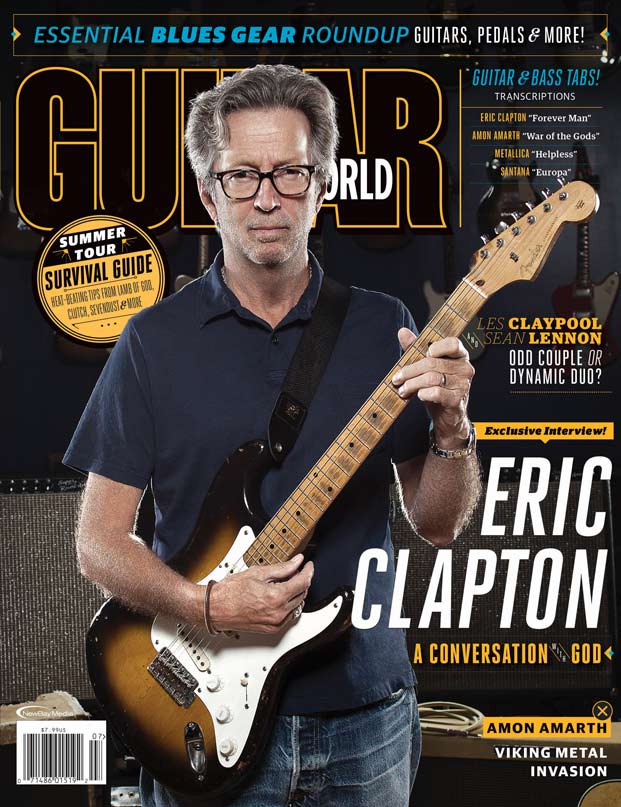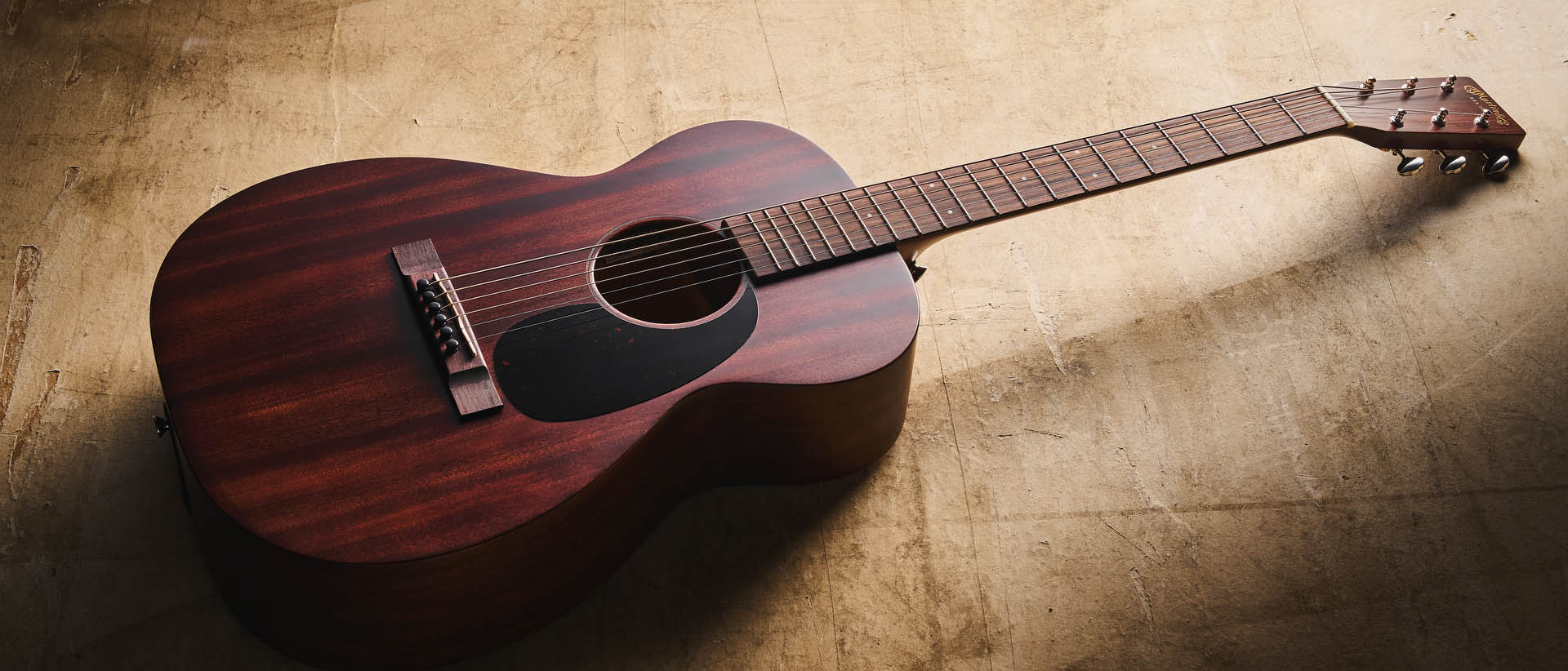'I Still Do' Blues: Eric Clapton Talks Robert Johnson's "Stones in My Passway"

Like his last two studio releases, 2013’s Old Sock and 2014’s The Breeze: An Appreciation of JJ Cale, Clapton's new album—I Still Do—finds the guitarist in a reflective mood, looking back at the artists and songs that inspired him as a young man, connecting with old friends—including producer Glyn Johns—and honoring family memories. And it all starts with the title.
“I Still Do is a tribute, a quote from my aunt, who passed away the year before last,” Clapton tells us.
“When I went to see her, I said, ‘I want to thank you for being who you were and looking after me when I was a little boy—and a difficult little boy.’ She said, ‘Well, I liked you and I still do.’ I thought, That's it.”
Besides several brand-new songs (including "Spiral," which we shared this week), a handful of "legacy" JJ Cale covers (check out "Can't Let You Do It") and more, I Still Do features a hefty chunk of guitar-driven blues.
Below, Clapton discusses several blues tracks, including his new versions of Robert Johnson's "Stones in My Passway" and Leroy Carr's "Alabama Woman Blues." For my complete interview, pick up the all-new July 2016 issue of Guitar World, which features Clapton—and his Strat—on the cover.
Although you’ve never officially recorded it until now, you played a solo-guitar version of [Robert Johnson’s “Stones in My Passway] on the Sessions for Robert J DVD in 2004. Around that time, you said it was a very difficult song to play because there’s a melody that’s happening beneath the vocal melody.
CLAPTON: Yes, there’s a passage. If we talk about it in terms of a 12-bar blues, it’s in the second section. The first section is the A section; when you get to the B section, and you move up to the IV chord, there’s a phrase he plays underneath his vocal that I can’t do. I can’t sing it and play that phrase, and I will never do it, I don’t think. I think I’ve tried all my life to figure out how to do that—because the time signature of the singing is one way and the playing is another.
All the latest guitar news, interviews, lessons, reviews, deals and more, direct to your inbox!
They’re syncopated in very different ways. So it's always needed to be an ensemble piece. We did it well, but I'm still... Glyn would tell you I'm still not satisfied. I still think we could do it better. [laughs] You'll be hearing that again.
Which explains the approach you took on this new version of the song, where the entire band imitates, in a way, Johnson’s guitar—or acts as an extension of your guitar—just as they did on several tracks on 2004’s Me and Mr. Johnson. Also, “Stones in My Passway” is one of at least three songs on the album that originated in the Thirties. Is that something you planned?
I’m not sure. I think it’s because they were important to the people I was learning music from, which was my family. My grandmother, my mother and my uncle were very, very influential to me. They would sing all day long. They’d be buying records and listening to stuff, and a lot of it was early jazz and swing. Paul Whiteman, Stan Kenton, the Dorsey brothers and a lot of those bands had singers, you know, like Frank Sinatra or Doris Day or Peggy Lee. So I heard all that stuff when I was knee-high.
By the time I got to be 9, 10, 11, when I was starting to hear blues, I was already well-versed in popular music of the Thirties and Forties. I kind of knew it, especially Fats Waller. I was hearing black and white music—without knowing what was black or white—in my home, from my family. So these songs, there's a deep kind of a reservoir of that stuff that I’m still tapping into. I know Rod Stewart’s been doing that for a while. I just chuck a couple in every now and then. But there's some great stuff back there.
You also cover Leroy Carr’s “Alabama Woman Blues,” which you’ve played in concert in the past. Around 12 years ago, you listed it as one of your 10 favorite songs of all time. What do you find so alluring about it—or at least about Carr’s original recording of it?
I think it was where it hit me in my own life. It was one of the first songs I heard as a teenager, not really knowing anything about Leroy Carr. But there’s something about the sadness of that song. There's a certain atmosphere to his recording. Something about it is so poignant, moving, simple and sad. My version is much more out there and upbeat, but you really should listen to Leroy Carr’s version.
There’s a lot of slide guitar on I Still Do. Besides Robert Johnson, who were—or are—your slide influences?
Well, there are two other guys. There’s Elmore James; there’s something about his vibrato that I’m absolutely riveted by. He plays it so beautifully. The other guy is a Texan musician called Hop Wilson who played on records and in the clubs around Fort Worth in the Sixties and Seventies, I think.
He played on a lap steel, so he played liked Robert Randolph, except he wasn’t “church,” he was blues, and I think he was unique in that respect. He plays some awkward tuning, I’m told; I think Jimmie Vaughan knows the tuning. It sounds to me like an open G or an open A, which leads me to play some of his phrases. I recommend you check him out. [Check out Wilson’s Houston Ghetto Blues on iTunes—Ed.]
I Still Do, which will be released Friday, May 20, is available for preorder on iTunes; three songs—"Can't Let You Do It," "Stones in My Passway" and "Catch the Blues"—are available for purchase now.


Damian is Editor-in-Chief of Guitar World magazine. In past lives, he was GW’s managing editor and online managing editor. He's written liner notes for major-label releases, including Stevie Ray Vaughan's 'The Complete Epic Recordings Collection' (Sony Legacy) and has interviewed everyone from Yngwie Malmsteen to Kevin Bacon (with a few memorable Eric Clapton chats thrown into the mix). Damian, a former member of Brooklyn's The Gas House Gorillas, was the sole guitarist in Mister Neutron, a trio that toured the U.S. and released three albums. He now plays in two NYC-area bands.
